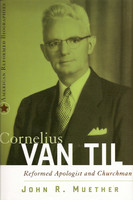Cornelius Van Til (1895–1987) offered a confessionally Reformed doctrine of the Creator-creature relation that stands out as distinct in contrast to both traditional Roman Catholic and contemporary Barthian alternatives. His Trinitarian theology of the Creator-creature relation supplied a pioneering enrichment of Reformed theology in the traditions of Old Princeton and Old Amsterdam.
In this volume, Lane G. Tipton interprets Van Til in his own historical and polemical context and demonstrates how the immutably dynamic life of the self-contained Trinity bears upon God’s relation to Adam in the work of creation, the act of special providence in covenant, and the person and eternal Son in the event of incarnation.
Tipton argues that Van Til’s Trinitarian theology deepens confessionally Reformed Trinitarianism and federalism in contrast to medieval Thomistic and modern Barthian theological alternatives. In a period marked by theological decline, he strives to clarify and extend confessional Reformed Trinitarian and federal theology in the service of the church’s union and communion with the immutable person of the crucified and ascended Christ of Scripture.
Author
